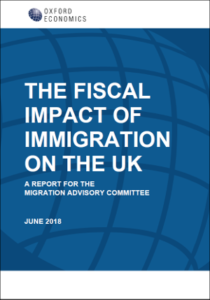Consulting | 18 Sep 2018
The Fiscal Impact of Immigration on the UK

Economic Consulting Team
Oxford Economics

European migrants living in the UK contribute £2,300 more to public purse each year than the average adult, suggesting a net contribution of £78,000 to the exchequer over their lifespan in the UK.
In preparation for Brexit, the government asked its Migration Advisory Committee (MAC) to report on the economic and social impacts of EU migrants in the UK. The MAC commissioned Oxford Economics to analyse the fiscal implications of immigration using the most up-to-date data and sophisticated modelling techniques.
The resulting study, The Fiscal Impact of Immigration on the UK, represents the most comprehensive assessment to date of the net contribution that all migrants make to the UK’s public finances.
The study finds that
- The average UK-based migrant from Europe contributed approximately £2,300 more to UK public finances in 2016/17 than the average UK adult. In comparison, each UK born adult contributed £70 less than the average, and each non-European migrant contributed over £800 less than the average.
- The average European migrant arriving in the UK in 2016 will contribute £78,000 more than they take out in public services and benefits over their time spent in the UK (assuming a balanced national budget), and the average non-European migrant will make a positive net contribution of £28,000 while living here. By comparison, the average UK citizen’s net lifetime contribution in this scenario is zero.
- Taken together, this means that the migrants who arrived in 2016 will make a total net positive contribution of £26.9 billion to the UK’s public finances over the entirety of their stay. The value of this to the UK’s public finances is equivalent to putting approximately 5p on income tax rates (across all marginal rate bands) in that year.
About the team
Our economic consulting team are world leaders in quantitative economic analysis, working with clients around the globe and across sectors to build models, forecast markets and evaluate interventions using state-of-the art techniques.
Related Services

Post
The Economic Footprint of JLR in the UK
This report examines the economic footprint of JLR in the United Kingdom in 2024. The analysis is conducted both at the national level, as well as on the West Midlands and North West regions, where JLR’s main facilities are located.
Find Out More
Post
Airbnb’s Economic Contribution to APAC in 2024: GDP, Jobs, and Regional Impact
Airbnb's platform connects hosts across Asia Pacific (APAC) with travellers from around the world. Oxford Economics was commissioned by Airbnb to quantify its economic footprint in 10 APAC markets in 2024.
Find Out More
Post
Economic Insights: Airbnb’s Contribution Through the Lens of Oxford Economics
Oxford Economics Australia delivered a tailored economic impact assessment for Airbnb, including GDP contribution modelling, job creation analytics, guest‑spend segmentation, and regional tourism dispersion insights to underpin Airbnb’s stakeholder communications and strategic growth initiatives.
Find Out More
